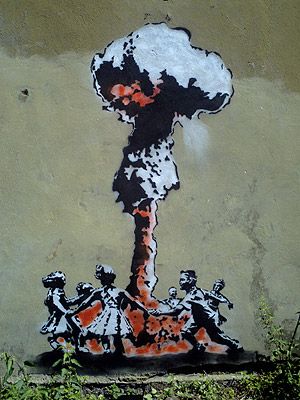
A lot of us probably spend most of our time on the cushion looking moments of clarity and instances of transcendence but, more often than not all we find are the pins and needles of a foot that has fallen asleep and the in-breaking of boredom. Yet, over and over again the great Zen master’s of the past tell us to seek, embrace and revel in the unremarkable, the commonplace, the everyday, the ordinary.
By Duane Toops
Last week I posted a video and article called “Insight Isn’t Pretty.”
In that video we tried to talk about how our desires and/or expectations to have certain kinds of special or extraordinary experiences in meditation can actually stifle our practice and hinder our progress. Instead, sometimes the most deeply meaningful moments of insight or realization come from the most ordinary of experiences. Sometimes the most significant moments of awakening occur in less than favorable conditions and in less than enjoyable occurrences.
Even though the goal (and I use that term loosely) of meditation practice is to see into the reality of our true nature, which is already Enlightened and already Awakened, this really isn’t that special. In fact, in the Zen school of thought the realization of one’s true nature, the realization of reality as it truly is, is perfectly ordinary.
We crave novelty.
We are ravenous for the exceptional. We have an immense—almost innate—desire for the surprising, the unexpected, the unprecedented, for special-ness and for the extraordinary. Meditation seems to be no exception to this desirous craving for the anomalous and outstanding.
A lot of us probably spend most of our time on the cushion looking moments of clarity and instances of transcendence but, more often than not all we find are the pins and needles of a foot that has fallen asleep and the in-breaking of boredom. Yet, over and over again the great Zen master’s of the past tell us to seek, embrace and revel in the unremarkable, the commonplace, the everyday, the ordinary.
The 7th-century Chinese Chan master, Linji, in describing the appropriate actions of the practice says, “Don’t try to do anything special, just act ordinary.” He says, “there’s no call for anything special. Just act ordinary.” He also says “When it’s time to get dressed, put on your clothes. When you must walk, then walk. When you must sit, then sit. Just be your ordinary self in ordinary life, unconcerned in seeking for Buddhahood.”
Linji explains that “the Dharma of the buddhas calls for no special undertakings. Just act ordinary, without trying to do anything particular. Move your bowels, piss, get dressed, eat your rice, and if you get tired, then lie down.”
Linji emphatically admonishes us to avoid the special and to actively advance the ordinary.
Now, if you’re anything like me, and you’re over-think everything, you probably can’t help but raise the questions:
What is ordinary? What does ordinary mean? What does it mean to call something ordinary, or to say that something is ordinary? What’s so special about the ordinary? Susan Murphy writes that “Ordinary means to be with what is.” Similarly, Daniel Scharpenburg suggests that “Ordinary…is another word for authenticity.”
The ordinary is the raw, genuine such-ness of life laid bare. It’s the abandonment of all the extraneous bullshit and pageantry. It’s the relinquishment of anything and everything that covers over reality just as it is, letting-go of all our expectations, anxieties and worries about what we think reality is. Instead, we are instructed to embrace the simplicity of life’s utterly ordinary is-ness.
I don’t know about you, but I think there’s actually something kind of extraordinary about that, and I think that’s the point.
Let me try to explain. In his essay Of Repentance, Michel de Montaigne writes that, “The virtue of the soul does not consist in flying high, but in walking orderly; its grandeur does not exercise itself in grandeur, but in mediocrity.” The grandeur of being, the grandeur of reality, the grandeur of our true nature, does not express itself in the pinnacles of grandeur, itself, but, instead finds its fullest and most affirmative expression in mediocrity of ordinary living.
Montaigne was neither a Buddhist, a meditator, nor a Zen practitioner, and yet, he seems to express a very Zen idea regarding meditative practice. In Zen, meditation is the space in which the ordinary comes alive with a near fathomless vibrancy.
Susan Murphy explains that in meditation, “ordinary things grow both plainer and stranger at once.” According to Murphy, meditation is the place where “the ordinary reveals its magic.”
We observe every minute detail of our experience, every inhalation, every exhalation, every passing thought, every bodily sensation, every twitch of the finger, every tingle in the toes, not because they are mystical but because they are mundane, and yet, paradoxically, in the full concentrated observance of mediocrity one witnesses the emergence of the miraculous.
Dogen says that “miracles happen three thousand times in the morning and eight hundred times in the evening.”
And, yet more often than not, despite our daily saturation with the miraculous we almost never notice. But, Dogen explains that part of what makes this abundance of everyday miracles so miraculous is that they don’t stop being miracles “when they are unnoticed,” they are “just as they are even when unnoticed.”
He writes that, “Even if you do not know that miracles happen three thousand times in the morning and eight hundred times in the evening, miracles are actualized.” So, where are all these miracles? What are they? How do we begin to notice them, to recognize them? Perhaps you could say that is precisely the point of the practice.
Dogen clarifies that, “Miracles are nothing other than fetching water and carrying firewood” and that “even when people do not know that fetching water is a miracle, fetching water is undeniably a miracle.” In other words, every aspect of our seemingly humdrum lives, every act, every task, every-thing, no matter how monotonous or unimportant, is an instantiation of the miraculous, not because it is esoteric or other-worldly but, because it is ordinary and that is the way in which the miraculous most ardently expresses itself.
We can look for the exceptional in the trembling of the earth as paradigms shift but, we’ll miss it. We can look for the extraordinary in the flicker and flame of grand ideas igniting but, we won’t see it. We can try to find the incredible in being blown away by the formidable winds of epic change but, it won’t be there. Instead, if we have ears to hear, we’ll find it in the softness of an ordinary whisper.
In this regard, the emphasis of the ordinary is not a call to apathy, nor is it a prescription of resignation. Instead this is the issuance of a challenge—a provocation—to recognize that the ordinariness of daily living is exceptionally novel. It is the provocative realization that the everyday-ness of everyday life is a grand event. It is a summons to see that the mundane mediocrity of each passing moment is a miracle.
Stephen Batchelor says that, “To meditate is to probe with intense sensitivity each glimmer of color, each cadence of sound, each touch of another’s hand, each fumbling word that tries to utter what cannot be said.”
The emphatic embrace of the ordinary is realizing that nothing is special and yet, recognizing that everything is extraordinary.
We can look for the exceptional in the trembling of the earth as paradigms shift but, we'll miss it. ~ Duane Toops Click To Tweet
 Duane Toops is a husband, a father, a fledgling Buddhist, a struggling meditator, and a self-proclaimed writer, thinker, and content creator. You can read his writing on his blog.
Duane Toops is a husband, a father, a fledgling Buddhist, a struggling meditator, and a self-proclaimed writer, thinker, and content creator. You can read his writing on his blog.
Photo: Pixabay
Editor: Dana Gornall
Did you like this post? You might also like:
Comments
- Zen Buddhism and the Blues - April 5, 2024
- Escaping from Jehovah’s Witnesses through a Buddhist Path - March 24, 2024
- Getting to Know Holly Herring - February 29, 2024





Trackbacks/Pingbacks